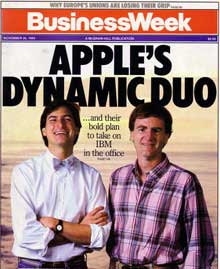
Rhiannon Williams, writing for The Telegraph, had the chance to interview John Sculley, the man who was instrumental in ousting Steve Jobs from Apple back in 1985.
When asked if he ever feels frustrated at how Jobs is presented, or misrepresented, in popular culture, Sculley pauses. “Misrepresented in what way?” he asks, tersely. People tend to draw on the more tyrannical aspects of his personality, I venture.
“I don’t think that’s fair. I think…” He pauses again. “People exaggerate, it’s simple to summarise and exaggerate. I found Steve, remember – at the time we were friends, we were incredibly close friends, and… he was someone who even then, showed compassion, and caring about people. “Didn’t mean he couldn’t be tough in a meeting and make decisions, and sometimes they seemed, y’know, overly harsh. But the reality was, the Steve Jobs I knew was still a very decent person, with very decent values. So I think he was misrepresented in popular culture.”
And:
The pair worked in harmony together on Apple’s 1984 Ridley Scott-directed Super Bowl television advert, but cracks began to appear when Sculley disagreed with Jobs’ plans to drop the price of the Macintosh and direct a large proportion of the marketing budget from Apple II to the Mac in the wake of the poorly-received Macintosh Office network, which later became Desktop Publishing.
“I said ‘Steve, the only cash for the company is coming from the Apple II, and we can’t do that,’” Sculley recalls sadly.
The working relationship between the two descended into a desperate struggle for power. The increasingly-erratic Jobs tried to lead an unsuccessful rebellion against Sculley in May 1985 with the goal of replacing him with Jean-Louis Gassée, then Apple’s director of European Operations. Gassée informed Sculley of the coup, who confronted Jobs at an executive committee meeting and demanded those present choose between the two men as to who they thought best to run the company. They backed Sculley, and Jobs fled the room.



